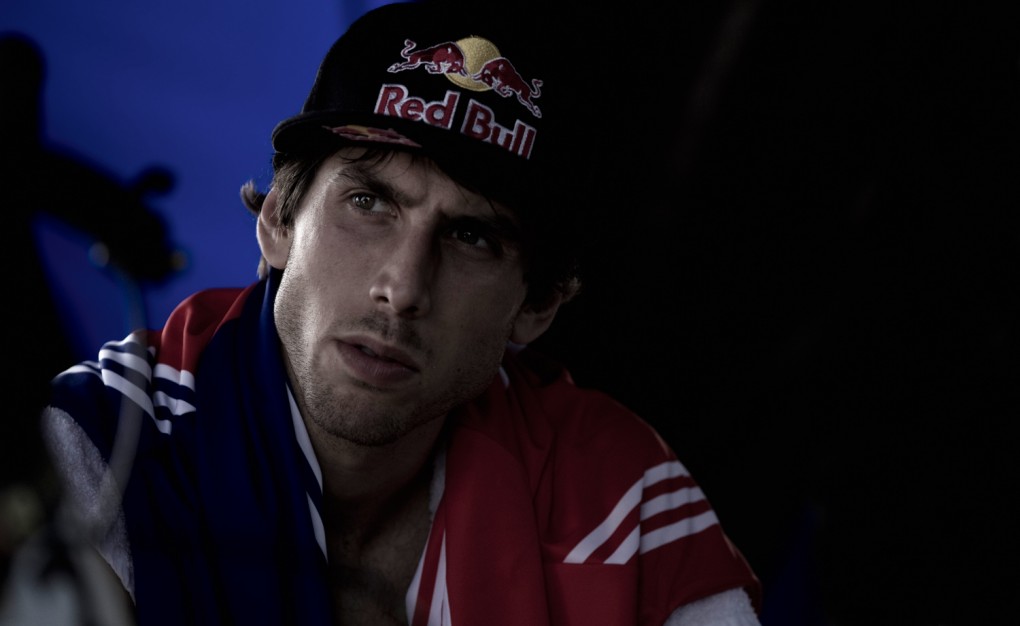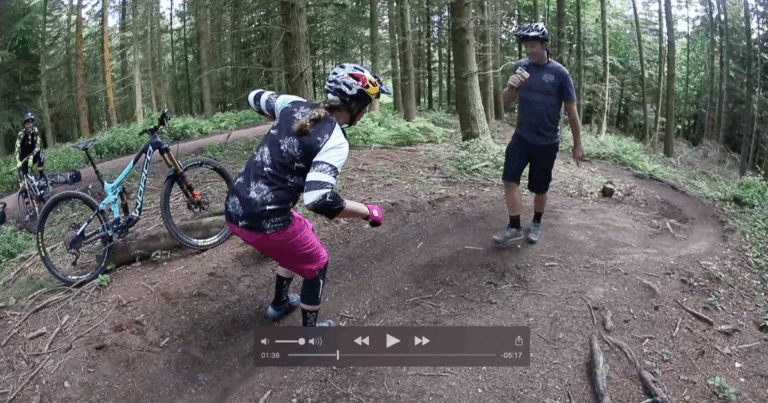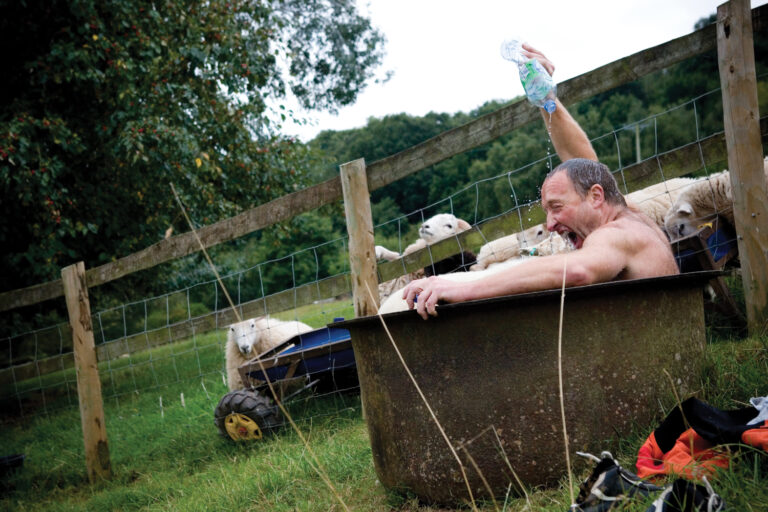
Mental toughness, two words that are often used to describe a key attribute for an elite performer. Thing is, ask someone what that actually means and be prepared for a torrent of conflicting advice and definitions. If you get two clinical psychiatrists in a room and ask them the question, you may be there a while…
From Dirt Issue 132 – February 2013
Words by Darren Roberts. Photo by Sven Martin.
Broadly ‘mental toughness’ describes a set of behaviours and attributes that allows one athlete to consistently cope better than another in a set of given circumstances, typically associated with overcoming some sort of adversity, whether that’s an injury or the crushing pressure of having to string one race run together to become World Champion. That’s a fairly broad description and can cover many things, as with everything at the elite end we want specifics and metrics – because if you can measure it, you can improve it. There have been several studies done into ‘mental toughness’ and the definitions of what it is seem to differ, as well as raising other questions. Is it nature or nurture, how can these behaviours and attributes be developed? Are there differences in male or female athletes? What about team sports or individual sports, does being ‘mentally tough’ as an individual carry over to a team scenario and vice versa?
I’m lucky with the athlete group I work with, as they clearly don’t suffer with the ‘normal’ concerns of other athletes. You have to have ‘interesting’ terms of mental reference when flinging yourself off a large building or across a large canyon gap, so I’m not saying any of the Red Bull athletes are not mentally tough. Where my athletes struggle is when they become injured, dropping 30ft from the roof of a warehouse is no problem, but not being able to compete through injury really tests them. I’m often asked what makes a champion, and my answer has always been consistent – champions are not ‘made’ when they win every race, but how they come through adversity and injury. When discussing injuries last month I talked about the importance of having a positive mental attitude and a desire to get better. An athlete being reminded of their mortality through a season–stopping injury can have a devastating effect on their confidence. A series of those injuries, which are then badly managed, and it’s easy to see how a once great athlete drifts away into obscurity. As this is predominantly an issue of the mind, the athlete doesn’t talk about it or ask for help. It’s not cool to say, “hey I’m struggling here, I could do with talking to someone”. One of the attributes of mental toughness can be self denial, which is great for convincing yourself you’re going to win despite all the odds, or coming back from a career ending injury, but it’s not such a great attribute if there is actually an issue that needs addressing.
I’m not a psychologist, psychiatrist or geneticist – I’m a fairly simple northern lad with a talent to persuade athletes to express their potential. So rather than go blind reading all the scientific studies into exactly what mental toughness is, measure it then try and improve it, it’s much easier to draw on personal experience and anecdotal observations from the athletes. There are without doubt more mentally resilient athletes than others, I’ve seen this and still see it. In the back of your mind you think, “I’m glad ‘x’ athlete is in that position because ‘y’ athlete would not be coping well right now”. As a coach it’s up to me to recognise what strengths each athlete has, which situations and environments they thrive in and try and ensure that they spend as much time in those situations and environments. Managing personalities and characters is a key function of any coach, and it’s not something you can do a course in. If you can’t manage those personalities you won’t get the best out of your athletes.
So how do I work on mental toughness with the athletes, and what is there for the weekend warrior to learn from it? As mentioned, there are several scientific studies, and even recognised questionnaires to measure how mentally tough you are. However, as I see it, something like mental toughness needs to be incorporated into everything an athlete does in a training situation every day, through ownership and responsibility. It’s not for me to sit down with an athlete like a pseudo psychologist, my domain is in the training environment. This is why I rarely tell an athlete what to do in training, despite what you may think or think you’ve seen me do – I don’t actually tell the athletes what to do. I give them a set of options to choose from (which range from hard to horrific, maybe all just horrific actually) and it’s the athlete’s choice which of the horrific sessions they do. Equally the session itself will also have decisions to be made in terms of order of exercise, so the athlete has total ownership of the pain they have brought on themselves. It’s also good to introduce an element of competition whether that’s against others or themselves, but again it’s all self selected (inflicted) so they are choosing to put themselves in that position. This means that training becomes one enormous series of mind games that the athlete brings on themselves. Athletes are all too often told what to do and when to do it, yet when it comes to self motivation and making decisions for themselves this is left to the most crucial time imaginable – when they have to perform in competition.
Getting them used to making decisions which put themselves in various states of extreme unpleasantness, combined with their natural competitive instincts all helps to train ‘mental toughness’ as you go, rather than sitting down and saying “OK, this is a mental toughness session”. You get the best of both worlds in both of effort put into the training session and helping them ‘toughen up’.
I’m not saying this is a substitute for bespoke help from a trained professional in coaching the mind. I’ve worked with many specialists who can help an athlete ‘figure themselves out’. Just as we want an athlete to know their own body it is equally important for them to know their own mind. Talent soon runs out at the top end and it soon becomes about hard work and attention to detail, it’s one of the reasons you see amazing junior athletes not transfer that success at senior level. Winning isn’t coming as easy as it used to and confidence soon slips.
Whether you’re an elite or weekend warrior you can employ these tactics into everything you do. Training session roulette is where you write down different training sessions, each more horrendous than the previous one, then draw out of a bowl or hat. 1000 Apologies is a training session some of the athletes have come to know well. You choose ten exercises, then have to do 100 reps of each exercise. However the order of those exercises and how many reps you do is up to you. This means you start playing a huge mind game with yourself thinking, “I’ll get all the dead lifts out of the way first and save the air squats till last”. You need to keep a running total of what you’ve done, and as you can imagine it doesn’t matter which way you try and skin this cat it turns into a nightmare of pain. When out on a XC with friends or on your own, set challenges on the way – if you don’t make it up an ascent in a certain amount of time you have to do it again. These are just some examples of what you could do, the limit to any of this is your imagination and something we call the mirror test. If you were on that XC ride, and you didn’t make the ascent in the time you set yourself and should go back down and do it again, will you ‘pass’ the mirror test by actually doing it? Or decide to lie to yourself and press on?
It shouldn’t all be about ‘stick’ though, there has to be some ‘carrot’. You should throw treats into these sessions as well, so it’s fair and balanced. The bigger the treat you put into the mix, the larger the ‘stick’ has to be though to balance the game out! You can have some real fun with this, especially with a training group.
If you can consistently pass the mirror test, then when you do become injured or find yourself at the top of a race run, you’re simply in a mental space you’re used to putting yourself in. Because you’ve consistently chosen to be in this place through training, you can cope and can see a way out of it – through knowing you can get yourself through it. Self reliance, self motivation and supreme confidence in your own ability through ownership, responsibility and accountability. Whether you’re a racer fighting for a World Championship or out shredding with mates, we could all use those attributes couldn’t we?
Darren Roberts is Head of High Performance at Red Bull UK working with the likes of the Atherton family, Danny MacAskill, MX enduro star David Knight and many, many others. Next issue: NutritionThis article is part of the Work Out series. You can find the rest of Darren Roberts’ training tips through the links below:
[series]





